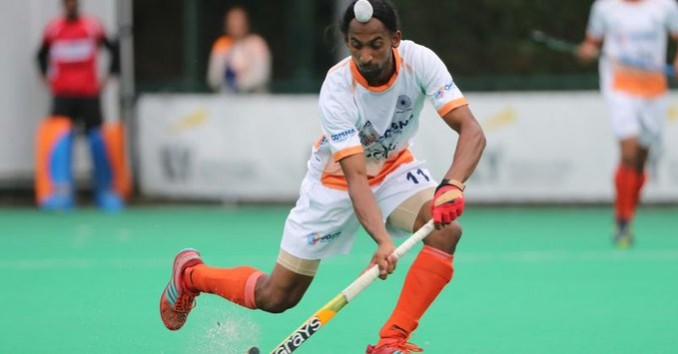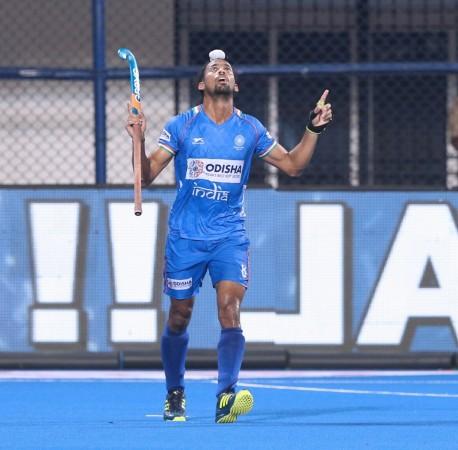
In the Indian sporting world, the name Hardik invariably refers to Hardik Pandya - the all-rounder in the cricket team. This Hardik has been making the headlines, sometimes for good and sometimes for bad reasons, and has come to be known for his flamboyance and boldness.
But there is another Hardik - Hardik Singh in the hockey team - who has been slowly establishing himself at the international level as a a very exciting young midfielder. A complete opposite to his namesake from the cricket world, Singh still gets teased by his senior teammates during interviews and comes across as slightly shy.
But with the Olympics less than a year away, he will play an increasingly important role in fulfilling coach Graham Reid's plans for the future. In an exclusive interview with International Business Times, India, the 21-year reveals how his journey at the international level has been in its first year.
Having played a lot of international hockey in the last year or so, are you now feeling at home at this level?
Hardik: Yes. My first tournament was last year in October. In the first two matches, I did feel a little nervous. After that, we had the World Cup. I thought I played well in the World Cup. Following this, there was the Azlan Shah tournament and the tour of Australia. I gained a lot of valuable experience from these events.
Also, our team has a lot of juniors. So, it wasn't as if there were only senior players in the team. But we also shouldn't be making excuses on account of us being juniors. We shouldn't say that we can't take responsibility. Overall, yes, I have gained good experience in the last year.

India lost a great midfielder in Sardara Singh due to retirement. But the current midfield also looks good with players like Chinglensana Singh and the captain himself, Manpreet Singh. Are you happy with the way the midfield is playing?
Hardik: Our midfield is working very well. We are giving ourselves more back options. And we have worked a lot in the last six months on those areas where we have room for improvement. I can say that we are quite satisfied with the way our midfield is working.
Since your coach Graham Reid likes the team to play aggressively, are you also expected to play high and push the ball forward to the strikers as quickly as possible?
Hardik: The first job that we have when we take the ball from the back is to give options to our defenders. Because if we don't give them options, they will be in a difficult situation regarding where to pass the ball. So, providing options to defenders is the first priority.
Then, we also need good communication especially when we are pressing. For some time, our coaches have emphasized the need for improving our communication. So, in the last few months, we have been working a lot on improving this area of the game.
Also, when a junior players comes into the team, he doesn't speak too much and is hesitant. This is also something that we have been doing well in the last couple of tournaments. New players who are coming into the team are speaking out, on the field too.
You had a workshop on defence some weeks ago where it was emphasized that it's not just the defenders who have to do the defending. The attackers and the midfielders form the first and the second line of defence. What did you learn from that workshop?
Hardik: Yes, we had Fergus Kavanaugh over for a special camp on defence. He was a very good defender for Australia in his day and shared his experience with us. While defending, you need patience, first and foremost. You shouldn't get too excited and commit yourself. So, he shared his experience which was a good lesson for us.

It has been said that Indian players are too keen to run with the ball and try to dodge the defenders. They don't pass the ball as much as they should. Is this something you had to work on as well?
Hardik: Yes, because currently, teams play in the zonal mode. So, when the ball comes into the midfield, we have to be ready. We should do the pre-scanning of the field even before we receive the ball. This ensures that when we get it, we don't need to dribble, and know where we should pass it on.
In zonal play, whenever we get the ball, we have to give a forward pass. This is because, if we start dribbling, then other teams would benefit and can mount a counter-attack. If you look at top teams in the world today, most of them are playing in the zonal mode.
When the other team is pressing hard and their midfield is putting a lot of pressure on you, how do you handle it?
Hardik: My way of dealing with pressure is converting it into excitement. So, for instance, if we are having a match with Australia and Jake Whetton and Eddie Ockenden are up against us, if I think I am playing against such big players, I would be putting myself under pressure. Whereas, if I think that I want to challenge these players, that creates excitement within me.
What we have discussed in the team meetings, we have to implement on the field of play. So, there are no worries regarding pressure. If there is pressure on me during a match, I do the simple things right and play normally. I won't run with the ball if I have it. The midfield that we have in the team, our captain Manpreet and Chinglensana, they guide us a lot.

How important are these senior players in the midfield?
Hardik: They have been playing at this level for the last 7-8 years, so they have a very big role in the mid-field. I remember during my first tournament, my second match was with Pakistan, I was feeling a bit of pressure. At that time, Manpreet came forward to guide me.
It's a great thing about senior players that if we are under pressure, they guide us. That's one quality which I really appreciate. If we are committing errors, they tell us about it but not in a rude manner. They understand us and know where we need to be told something and where not.
When you play against tougher teams like Australia and Belgium, every time you get the ball, you will be challenged by 2-3 players. Are you prepared for that?
Hardik: Well, in World Cup also, most of the teams played in the zonal mode and not in a man-to-man fashion. In training also, we are made to train for zonal style because most of the time, our team also plays in that manner.
So, we have become used to it. I also think that Indian team plays very well in zonal mode. Man-to-man, we are not playing that well. If the other team is playing in the zonal mode, then we know what we need to do.

How are the preparations going for the 2020 Olympics, with less than a year remaining?
Hardik: Olympics is, probably, the biggest stage in hockey. We are greatly excited about it. But our qualifiers against Russia are coming up. So, right now, we are not thinking about the Olympics but the qualifiers. It's on those matches we are focussing on. After that event, we will see what we can do for Tokyo.
Of all the teams that you have played at the international level, which has been the most difficult to deal with?
Hardik: Australia is the most difficult. That's because their midfielders are among the senior-most in world hockey. Players like Jake Whetton, Aran Zalewski and Eddie Ockenden are there. Our midfield has players like me and Vivek Sagar Prasad who are not very experienced compared to them. When we play against them, we get good experience. So yes, Australia is the toughest among them all, I think.









